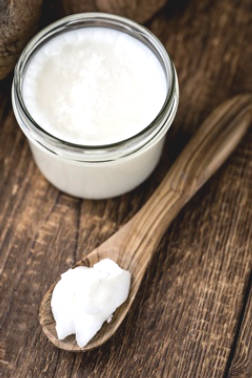
In the past few years, medium chain triglyceride (MCT) has received the attention of many people.
This is partly due to the benefits of coconut oil , an abundant, widely published MCT supply.
These fat advocates claim that MCT can help weight loss .
In addition, MCT oil has become a functional food favored by athletes and bodybuilders.
This article will cover everything you need to know about MCT, including its definition and health benefits.
What is MCT?
MCT stands for medium-chain (medium chain triglycerides), a type of fat found in foods such as coconut oil. They are metabolized differently from long chain triglycerides (LCT) found in most other foods.
MCT oil is a fat-rich supplement and is believed to have health benefits.
Simply a kind of fat. It has two main tasks - being transported into cells and burned to produce energy, or stored as body fat.
Triglycerides are named after their chemical structure, namely the length of the chain of fatty acids. All types of triglycerides are made up of molecules and 3 fatty acids.
The majority of fat in the diet is long chain fatty acids, containing 13-21 carbon. Short-chain fatty acids have less than 6 carbon atoms.
The average chain fatty acid in MCT has 6-12 carbon atoms.
These are the main medium fatty acids:
- C6: Caproic acid or hexanoic acid.
- C8: caprylic acid or octanoic acid.
- C10: capric acid or decanoic acid.
- C12: Lauric acid or dodecanoic acid.
Some experts believe that C6, C8 and C10, also known as "capra fatty acids", carry more properties of MCT than C12 (lauric acid) .
Conclude: Medium chain triglycerides (MCT) are 6-12 carbon fatty acids such as caproic acid (C6), caprylic acid (C8), capric acid (C10) and lauric acid (C12).
MCT is transformed in a very different way
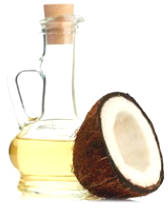
Because it is short-chain fatty acid, MCT is quickly broken and absorbed into the body.
Unlike long chain fatty acids, MCT goes straight to the liver.
In this substance can be used as an instant energy source or converted into ketone (this is the substance created when the liver breaks a large amount of fat).
Unlike regular fatty acids, ketones can move from the blood into the brain, providing an alternative energy source for glucose from the brain.
Because the calories contained in MCT are converted into energy and used more thoroughly by the body, they are less likely to be stored as fat.
Conclude: Because of the shorter sequence, MCT quickly breaks down and absorbs into the body. This makes this fat an instant energy source and less likely to be stored as fat.
MCT supplies
There are two main ways to increase the amount of MCT in the diet, either through food sources or through functional foods such as MCT oils.
Supply from pure food
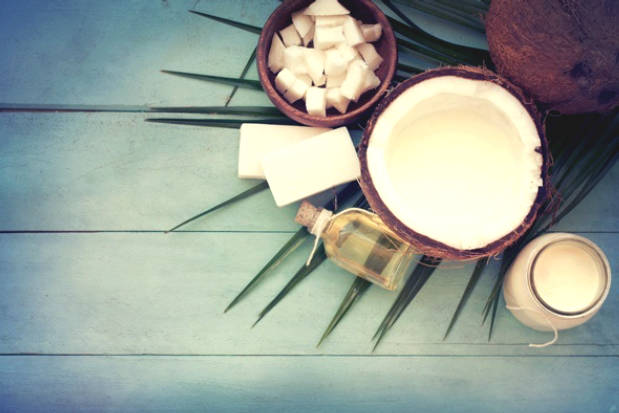
These are medium-high triglyceride foods, the MCT content is expressed by the percentage of total fatty acids :
- Coconut oil: More than 60%.
- Palm kernel oil: More than 50%.
- Milk product: 10-12%.
Although the above sources contain a lot of MCT, their components are quite different. For example, coconut oil contains all four types of MCT, and a small amount of LCT.
However, in MCT of coconut oil contains a large amount of lauric acid (C12) and a small amount of "capra fatty acid" (C6, C8 and C10). In fact, in lauric acid (C12) coconut oil accounts for about 50%, making it one of the best natural sources of this fatty acid.
Compared to coconut oil, the proportion of capra fatty acids (C6, C8 and C10) in dairy products tends to be higher and the rate of lauric acid is lower (C12).
In milk, capra fatty acids account for 4-12% of total fatty acids, and lauric acid (C12) accounts for 2-5% .
Conclude: All MCT supplies from food include coconut oil, palm kernel oil and dairy products. However, the MCT ingredients in these foods are different.
MCT oil
MCT oil contains high average triglyceride content.
This oil is created through a process called fractional distillation. This is a method of separating and isolating MCT from coconut oil or palm kernel oil.
MCT oils usually contain 100% caprylic acid (C8), 100% capric acid (C10) or a combination of both.
Caproic acid (C6) is often removed because of its unpleasant taste. Lauric acid (C12) also often has no or only small amounts in oil .
Although lauric acid is the main ingredient in coconut oil, be careful, because MCT oil producers have misunderstood when advertising their MCT oil as "diluted coconut oil."
There are conflicting opinions about whether lauric acid reduces or increases the quality of MCT oil.
Supporters argue that MCT oil is better than coconut oil because of it caprylic (C8) and capric acid (C10) is believed to absorb faster and produce energy more easily than lauric acid (C12).
Because long chain fatty acids C13 and lauric acid (C12) have quite similar structure, some experts believe that C12 can act like a longer chain fat. That's why this substance has less value.
Despite the evidence that lauric acid is absorbed more rapidly by the body than LCT, one study has shown that extending carbon sequences onto two atoms can slow the diffusion rate by 100 times .
Therefore, compared to other medium chain triglycerides, lauric acid has a lower energy efficiency. However, this acid also has health benefits without any fatty acids.
For example, lauric acid is more effective at killing harmful bacteria and viruses than caprylic acid (C8) and capric acid (C10) .
Conclude: MCT oil is a large source of certain types of MCT. This product usually contains C8, C10 or a combination of both.
Which MCT supply should you choose?
The best source for each person depends on the purpose and the amount of MCT they want to absorb.
We still do not know the exact dose to achieve health benefits. In studies, the dose used ranged from 5-70 grams (0.17-2.5 oz) MCT daily.
If you want to have a good overall health, using coconut oil or palm kernel oil in cooking is probably the right choice.
However, if you want to use a larger amount you can consider using MCT oil.
One of the advantages of MCT oil is that it has almost no taste. This oil can be eaten directly or in combination with food or drinks.
Conclude: Coconut oil and palm oil are plentiful sources of MCT, but supplements such as MCT oils contain larger MCT contents.
MCT oil can help lose weight in many ways

- Lower energy density: MCT provides 10% less calories than LCT (MCT provides 8.4 calories / gram compared to 9.2 calories / gram from LCT) .
- Increased satiety: One study found that compared to LCT, MCT caused YY and peptide leptin stronger increase. These are two hormones that help reduce appetite and increase satiety .
- Store fat: Because MCT is absorbed and used faster than LCT, these fatty acids are less likely to be stored as body fat .
- Calorie burning: Animal and human studies show that MCT (mainly C8 and C10) may increase the body's ability to burn fat and calories .
- Reduce fat more effectively: One study found that a diet rich in MCT can help burn and reduce more fat than diets that contain a lot of LCT. However, these effects may disappear after 2-3 weeks when the body has adapted .
- Low-carb diets: Low-carb diets or ketogenic diet are effective ways to lose weight. Because MCT produces ketones, adding MCT to the diet can help you eat a lot of carb and still keep the ketosis state (the state of using fat as energy).
Conclude: MCT can help lose weight by reducing calories, increasing satiety, reducing stored fat, promoting calorie burning and increasing ketone levels in low-carb diets.
Can MCT really help lose weight?

Although many studies have found a positive effect of MCT on weight loss, other studies have failed to produce findings related to this problem .
In a review of 14 studies of MCT, 7 studies evaluated the ability to create satiety, 8 studies on weight loss effects and 6 studies evaluating the ability to burn calories.
Only one study found that MCT helped increase satiety, six studies showed a reduction in weight and 4 studies showed an increase in calorie burning .
In another review of 12 animal studies, 7 concluded that there was a possibility of supporting weight loss and 5 did not find any difference. Regarding the amount of food intake, 4 studies found a decrease, 1 was found to increase and 7 did not make any difference .
In addition, the reduced weight thanks to MCT is really modest.
A review of 13 studies showed that the average weight loss under the MCT-rich diet for at least 3 weeks was only 1.1 lbs (0.5 kg), compared with the LCT-rich diet .
Another study found that the MCT-rich diet could help reduce more than 2 pounds (0.9 kg) compared to the diet rich in LCT for 12 weeks .
However, we still need more intensive research to determine the effectiveness and dose of MCT in weight loss.
Conclude: A diet containing MCT may help with weight loss, although the effect is generally quite modest.
Evidence suggests that MCT is less effective in improving athletic performance
MCT is believed to help boost energy during intense exercise and is an alternative energy source for stored glycogen.
This substance has a positive effect on endurance and benefits athletes when they follow low-carb mode .
An animal study showed that mice fed the MCT-rich diet had better performance in swimming tests than mice fed the LCT-rich diet .
In addition, consumption of food containing MCT instead of LCT for 2 weeks increased the intensity of exercise time of athletes in recreational sports .
Although the evidence seems to be positive, we still do not have enough research to confirm this benefit, and the conclusions are still uncertain .
Conclude: MCT's ability to improve training performance is not certain and we need to do a lot of research to validate these claims.
Other potential benefits of MCT oil
The use of medium-chain triglycerides and MCT oils may provide some health benefits.
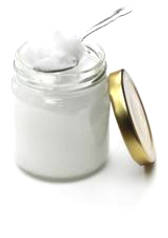
Cholesterol
MCT has been thought to reduce cholesterol levels in both animal and human studies.
For example, calves fed with MCT-rich milk had lower cholesterol than calves fed LCT-rich milk .
Several studies in mice have shown that coconut oil can help improve cholesterol levels and increase antioxidant vitamins .
According to a study of 40 women, consuming coconut oil in combination with a low-calorie diet will help lower LDL cholesterol and increase HDL cholesterol more than women who eat soy oil .
Improvements in cholesterol and antioxidant levels may reduce the risk of heart disease in the long term.
However, one important thing to note is that some studies that have been done for a long time have shown that MCT supplements have no effect and even have a negative effect on cholesterol .
A study of 14 healthy men found that MCT supplements had a negative effect on cholesterol. These products increase the total cholesterol and LDL cholesterol .
Conclude: Diets containing a lot of MCT-rich foods like coconut oil may benefit cholesterol. However, the evidence presented to prove this is quite contradictory.
Diabetes
MCT can also help reduce blood sugar. In one study, the MCT-rich diet helped increase insulin sensitivity in adults with type 2 diabetes .
Another study of over 40 overweight people with type 2 diabetes showed that MCT supplementation improves the risk factors for diabetes. These fatty acids can reduce body weight, waist circumference and insulin resistance .
However, the evidence that the effectiveness of MCT in treating diabetes is very limited. We need more research to confirm these benefits.
Conclude: MCT can help reduce blood sugar by reducing insulin resistance. However, we need to do a lot of research to confirm this benefit.
Brain activity
MCT produces ketones, which act as an alternative energy source for the brain and can improve brain function.
Recently, people are interested in using MCT to treat or prevent brain disorders such as Alzheimer's disease and dementia .
A large study has found that MCT improves brain learning, memory and information processing in people with mild to moderate Alzheimer's disease. However, this only happens in people who carry a particular gene, the gene .
In general, the evidence is limited to short-term studies with limited research subjects, so we still need more in-depth studies.
Conclude: MCT can improve brain function in people with Alzheimer's disease who have a special gene. This issue needs to be studied further.
Other medical conditions
Because MCT is an energy source that can be easily absorbed and digested, these fatty acids have long been used to treat malnutrition and disorders that interfere with nutrient absorption.
MCT can be helpful for conditions like diarrhea, dyspepsia and liver disease. MCT is also great for patients undergoing bowel or stomach surgery.
Evidence also supports the use of MCT in ketogenic diets to treat epilepsy .
The use of MCT allows children with epilepsy to eat more as well as more tolerance calories and carb than the old ketogenic diet .
Conclude: MCT is effective in treating a number of clinical diseases including malnutrition, malabsorption and seizure disorders.
Dosage, safety and side effects
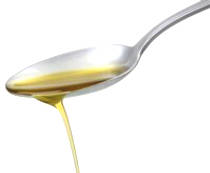
It is still unclear what exact dose of MCT to bring about health benefits, but some additional brands recommend that we take 1-3 tablespoons daily.
There are currently no findings about the undesirable effects of this fatty acid on drugs or other serious side effects.
However, some mild side effects have been detected such as nausea, vomiting, diarrhea and stomach pain.
We can avoid these symptoms by starting small doses, such as 1 teaspoon and then gradually increasing. Once your body gets used, you can increase the amount of MCT oil to 1 tablespoon.
Type 1 diabetes and MCT
Some people recommend that people with type 1 diabetes should not take MCT because it produces ketones.
It is thought that high blood ketone levels may increase the risk of ketoacidosis, a very serious condition that can occur in patients with type 1 diabetes.
However, ketosis caused by low-cab diets is completely different from ketoacidosis in diabetics, as this is a very serious condition due to lack of insulin.
In people with good control of diabetes with levels blood sugar Stable, the amount of ketone remains within the safe range even in ketosis.
There are very few studies on the use of MCT in type 1 diabetes. However, some studies have been conducted and show that this substance has no adverse effects .
Conclude: MCT oil is safe for most people, but there are currently no clear guidelines for dosage. You should start taking small doses before gradually increasing.
Things to remember
Medium-chain triglycerides bring many potential health benefits.
Although this is not an outstanding weight loss method, this fatty acid can also be quite modest. It also offers the same effect with endurance exercise.
For these reasons, adding MCT to diet is also recommended.
However, keep in mind that the entire supply of MCT from food such as coconut oil and herbivorous dairy products has benefits that supplement products do not have.
